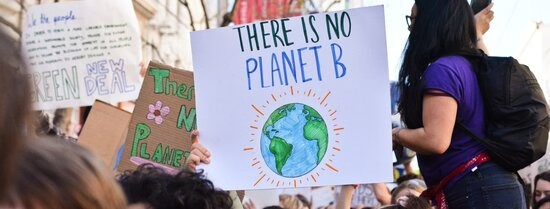Associate professor Chiara Cadeddu, Chair of the research theme on Planetary Health at Erasmus School of Health Policy & Management (ESHPM), is on a mission to connect the dots between climate, care systems, and human wellbeing. In this powerful conversation, she shares why the climate crisis is already a public health emergency, and what gives her hope for the future.
How is the climate crisis already hurting our health?
“We often say climate change, but from a sociomedical lens, I prefer to call it the climate crisis,” says Dr. Cadeddu. “It’s not something far away or abstract, it’s affecting public health right now, and in many ways.”
She outlines a cascade of consequences: rising heat-related illnesses, worsening air quality, the spread of infectious diseases, declining food and water security, and escalating mental health issues.
“What makes it worse is how these effects hit the most vulnerable: children, older adults, people with disabilities, and those already facing social and economic inequalities. This is not just about melting ice caps. It’s about lives and systems breaking down.”
Can healthcare systems save the planet and patients?
“Absolutely, and they must,” she says. “Healthcare systems can and should become part of the solution.' She explains that health facilities contribute to emissions and waste, but they also hold enormous potential to lead by example. “By switching to low-carbon models like telehealth, improving energy efficiency, and reducing resource use, we can protect health without damaging the ecosystems we rely on.”
Unfortunately, too often policies are made without a strong evidence base, she explains. “This leads not only to public harm but also to greater financial costs. As scientists, we have a responsibility to bridge this gap, helping people understand the real-life impact of decisions. And voters need to be informed of this before casting a ballot.”
Why is planetary health so urgent right now?
Dr Cadeddu doesn’t hesitate with her words: “The tipping points are coming faster than we think. This is not a problem for 2030. It’s a problem for today.”
She points to the Planetary Health Annual Meeting in Rotterdam, which she is helping to host, as a symbol of this urgency. “Our message is simple: act now. If we wait even a few more years, we risk crossing critical planetary boundaries that will make recovery impossible.”
Planetary health, she insists, is no longer just a scientific or ethical issue, it’s an issue of survival.
What real-world solutions give us hope?
“There are many solutions already available,” she says. “And the beauty is that many of them come with what we call ‘co-benefits’, they help both people and the planet.”
She gives examples of personal changes such as eating less meat, choosing plant-based meals, using public transport, and biking more. But she also leads systemic work through the Caring Nature Horizon Europe project, which is developing decarbonization strategies for healthcare, including better governance, energy use, and waste management.
“What’s needed now is scaling these solutions. Tools exist. Let’s use them.” At the same time, she also points out the serious challenges, “I think one major gap lies in connecting scientific knowledge to action, especially at local levels. We have enough knowledge, but we often lack practical, context-specific pathways to implement solutions.”
Next to this, our knowledge needs to be diversified. “We need to integrate other perspectives and knowledge, like indigenous and experiential knowledge in understanding how social and ecological systems interact. We still miss research coming from the Global South.”
What keeps you motivated in the face of a global crisis?
Her answer is immediate: “Young people. I love teaching because this generation gets it. They understand planetary health better than many of our current leaders. I feel deeply connected to their passion and their determination to change systems, which I believe is the key to overcoming the planetary crisis.”
She also finds strength in history. “Radical change has happened before, think of the abolition of slavery, or women winning the right to vote. Those seemed impossible too. But with pressure, courage, and collective action, they became reality.”
But she’s also clear-eyed about what must change: “If I could erase one phrase from society, it would be: ‘We’ve always done it this way.’ That kind of thinking is dangerous. The crisis is here. And every day we delay makes it worse.”
Final Words: The Time to Act Is Now
For Chiara, Planetary Health isn’t just a research field, it’s a call to action. Her work bridges science and policy, helping us understand how to protect both human life and the ecosystems we depend on.
“We can’t afford to wait. Every person matters. Every decision counts. And every moment we delay is a missed chance to protect what we love.”
- Associate professor
- Related content

